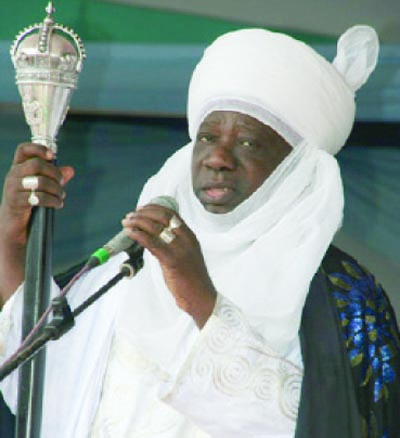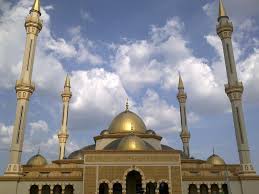Ilorin, the Kwara State capital, is today fast assuming a new status as an ancient city but with tourism high potential to pleasure seekers within and beyond the shores of Nigeria. One of the best architecturally designed mosques in Nigeria is located in Ilorin at the Emir’s market otherwise known as Oja Oba. The Juma’at Central Mosque could be best described as an international monument.
To a visitor, the new ultra-modern 20,000 capacity Juma’at Central Mosque is an edifice to behold, hence it is dubbed The pride of Ilorin. Its gates design and interior décoration are a replica of the second grand Mosque in Medinah, Saudi Arabia (the Mosque of the holy prophet Muhammed).
The six gates leading to the Mosque are named after some prominent leaders of the town who have distinguished themselves as the light of Islamic faith. Aside from its tourism potentials as well as being a place of worship, the new mosque has also brought about the cleanliness to the hitherto dirty Oja-Oba environment. The vicinity has been cordoned off with the Mosque’s security officials maintaining a 24-hour surveillance of the area. An environmental firm of international repute has also been engaged to ensure the cleanliness of the mosque and its environs at all times.
About N1.95 billion was expended on the expansion, re-modeling and general rehabilitation of the mosque which was first commissioned in 1981. The very first Ilorin central mosque was found in 1820. This was followed in 1835 when another central Mosque was built at Idi-Ape during the reign of AbdulSalam, the first Emir of Ilorin.
Sobi Hills, believed to provide protection to the natives during the ancient inter-tribal wars are also a tourists delight. Others are Okuta Ilorin located at Idi-Ape Quarters, from where the name of the city was derived. There is also Alfa Alimi’s mosque which was constructed in 1881.
STATUTE OF HORSE RIDING IN ILORIN.
Other places of attraction to tourists include the newly constructed multipurpose Banquet Hall located at Ahmadu Bello Way, Kwara Stadium Complex, new flying over bridge, national museum and monuments, Asa dam, Amusement park and International Aviation College. Ilorin International Airport, which also serves as International Cargo Airport operates local and international commercial flights. Besides, the International Conference Centre, ICC, situated along University Road, Tanke built by the RHEMA chapel is second to none among the Christian places of worship in the state capital.
Social and nightlife thrives in Ilorin. Though, in some areas of the city, liquor selling is forbidden, for those who love night life, various interesting hangouts which spread across the city provides good entertainment, including hot sizzling pepper soup prepared with any of fresh fish, smoked fish, goat meat, snake meat, bush meat snail and chicken. There are many hotels and guest houses which are daily patronized by all and sundry.
Historical account has it that the name of the ancient city was derived from Okuta Ilo-Irin which is located at the present day Idi-Ape Quarters. ‘Ilo-Irin’ meaning iron sharpener.
The account states that a Yoruba hunter and a prince from Ila-Orangun, the present day Osun State, known as Ojo Isekuse founded the ancient city, even though another account claims that Ilorin was founded by Afonja, the Yoruba generalissimo from old Oyo Empire, Afonja.
Significantly, Ilorin has grown to become a cosmopolitan city that continues to receive visitors from all walks of life on daily basis. Ilorin’s geographical location in the north central makes it easily accessible to all parts of the nation by air, road and rail transport. In fact, it is often regarded as gateway to the northern and southern Nigeria.
The indigenes, from time immemorial, are predominantly into farming, blacksmithing, weaving, pottery, beadwork and trading. The city was noted for Lantana bead of red coral up to the middle of 20th century. In modern times, the inhabitants are technocrats, captains of industry, legal luminaries, civil servants to mention a few.
Ilorin is famous for its rich culture interwoven with Islamic religion; hence it is often referred to as a ‘Centre of Islam and culture’. One of its sustained cultures is ‘Iyawo dance’.
It is a dancing group associated with traditional marriage. A group of maids mainly teenagers constitute the group called “Ore Iyawo” (Bride’s friends). It involves mainly clapping, dancing and singing to beats. The main instrument is “Agbe” (gourd) of a special size and stick for beating the gourd accompanied with clapping to supply the desired sound.
Newly built Central Mosque at Emir’s Palace, Ilorin.The first Mossque built by Alfa Alimi around 1831
Ilorin is populated by all the major tribes in Nigeria including, Yoruba, Hausa, Fulani, Nupe, Baruba and Kanuri as well as other ethnic nationalities who cohabit peacefully. The diverse nature of Ilorin makes it a place where the inhabitants speak different indigenous languages. In the field of education, Ilorin people have contact with both islamic and western education around 18th and19th centuries respectively. The first primary school, Pakata LGEA School was established around 1930, while the premier secondary school (Ilorin Middle School) and now Government Secondary School was established in 1949. Since then, the ancient city has advanced educationally as it has more than 150 primary and post-primary institutions, including standard private schools.
Most of the higher institutions of learning located within the state capital include the University of Ilorin, Al-Hilkma University, Kwara State Polytechnic, College of Education, College of Arabic and Islamic Legal Studies (CAILS), School of Nursing and Midwifery, Michael Imoudu Institute for Labour Studies (MIILS), Federal Training Centre and Nigeria Stored Products, Research Institute (NSPRI), National Centre for Agricultural Mechanization (NCAM) and Agricultural and Rural Management Institute (ARMTI) among others.
The ancient city is wearing a commercial look as strategic places within the metropolis serve as commercial centres apart from the major markets such as Baboko market, Ipata Market, Oja-Oba and Ojagboro among others. The General Post Office area is fast becoming the Broad Street of Ilorin with the increasing human and vehicular traffic. The city’s economic growth is complemented by the large presence of branches of major commercial banks in Ilorin.
SOURCE: Newswatch













